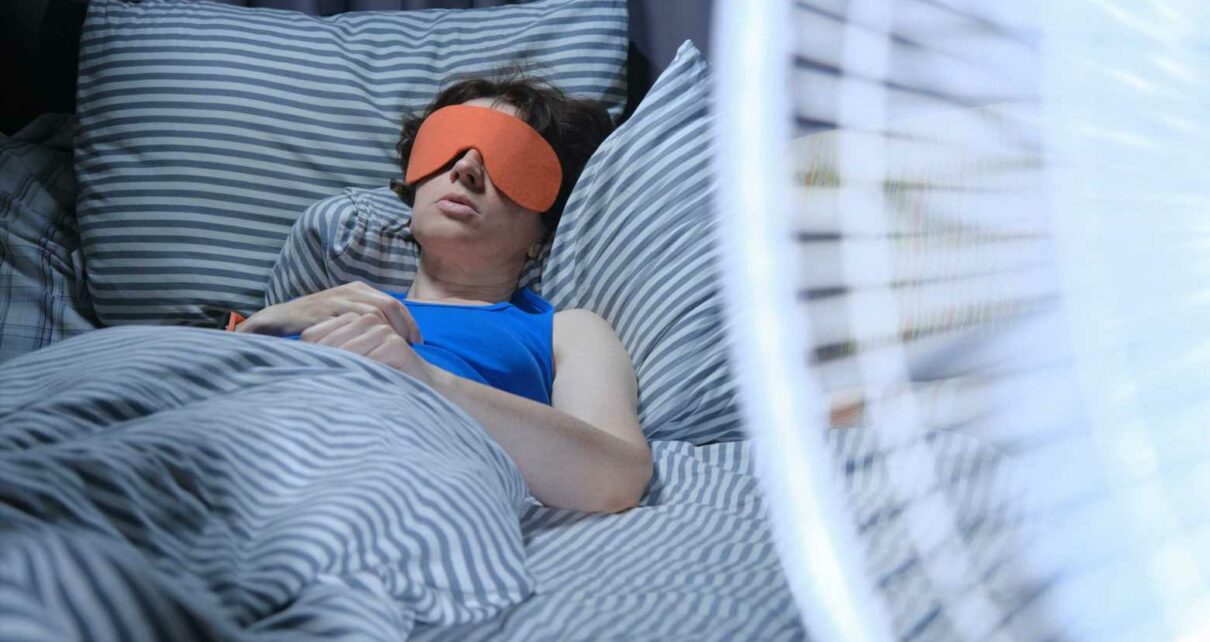AS temperatures rise, many brits have pulled out their trusty fans in a bid to beat the heat.
But as tempting as it may be, leaving a fan running all night could do more harm than good – and here's why.

Is it safe to sleep with a fan on?
Sleeping with a fan on may present a number of disadvantages to those with allergies, asthma and hay fever.
According to The Sleep Advisors, while a fan does circulate air to make your room cooler, it can also circulate pollen and dust.
The sleep experts said: "Take a close look at your fan.
''If it’s been collecting dust on the blades, those particles are flying through the air every time you turn it on.''
Read More in Fabulous

I sang impromptu gig for Deborah James’ 40th, says pal Sophie Ellis-Bextor

We tested Marks & Spencer’s new skin range – what works best for spots & glow?
If you're prone to allergies, it could be worth trying other options like a cool flannel in a bowl of water near your bed or keeping the blinds or curtains shut to keep the room cool.
Leaving a fan running all night can also cause a stiff neck, sore muscles and dry out your skin, as well as your nasal passages.
What are the side effects of sleeping with a fan next to you?
As mentioned above, sleeping with a fan running cause a fair amount of discomfort for some – therefore, it's important to know the side effects caused when using a fan to beat the heat.
For those who suffer from allergies, sleeping with a fan next to you can cause uncomfortable symptoms such as a runny nose, itching, and coughing.
Most read in Fabulous

I'm thick and hot – people say 'moms shouldn't wear bikinis' but I don't care

I was left looking like a shark after getting £3k Turkey teeth

My pal couldn’t afford rent so I transformed an old caravan for her to stay in

Inside the super-plush £24K Glasto tents that guarantee a clean loo
Martin Seeley, the CEO and sleep expert of MattressNextDay said: ''If you find that you’re suffering from excessive sneezing, watery eyes, a runny nose, itchy throats and even breathing difficulties, make sure that there is no dust on the blades of your electric fan.
''If you have the budget, it is worth upgrading to a better fan that can purify the air by reducing the pollen particles and dust mites throughout the room.
''However, if this isn’t possible, regularly deep cleaning your bedroom will help alleviate your allergies.''
Sleep experts also told Women's Health that sleeping with your fan on full blast could dry out your skin, as well as your nasal passages.
Despite what you might think, this can make your body produce excess mucus and make you feel bunged up, according to the sleep experts.
Those sleeping with a fan on over night may also find themselves waking up with stiff and sore muscles.
"This is because the concentrated cool air can make muscles tense up and cramp," The Sleep Advisors said.
"This problem is especially common for people who sleep with it near their face and neck. If you’ve been waking up with a stiff neck in the morning, it might be because of the constant breeze."
Can you leave a fan on all night?
While it's a good last resort instead of suffering through the heat, leaving a fan going for hours on end is not advised.
As well as taking into consideration health risks, it is also important to consider safety when using a fan in sweltering conditions.
Giuseppe Capanna, Product Safety Engineer from the Electrical Safety First charity, warned: ''In sweltering conditions it is much more likely Brits will turn to their trusty fans to cool down but we advise against being tempted to leave them running all night when you’re sleeping.
''If your fan starts to show signs that something is wrong such as a; burning smell, sparks or an unusual buzzing sound develops your response time will be greatly delayed.
''As a consequence there could be an increased risk of a fire developing if you are unable to respond to the situation quickly enough.
"Motors within fans can be easily put under unnecessary stress such as if the fan falls over or becomes obstructed and so it is vital you can keep an eye on your fan when it’s on.
"Don’t risk an overheated motor in your bid to stay cool at night."
Read More On The Sun

I’m a pregnant mum-of-2 and we live in a tent after our landlord kicked us out

BA stewardess makes huge blunder – costing airline £50k & forcing her to fly home
Experts also advise switching a fan off while you are out of the house and switching it off at the socket when not in use.
Want to keep cool at night without needing a fan? Theresa Schnorbach, Sleep Scientist at Emma – The Sleep Company provides her top tips here.
Source: Read Full Article



